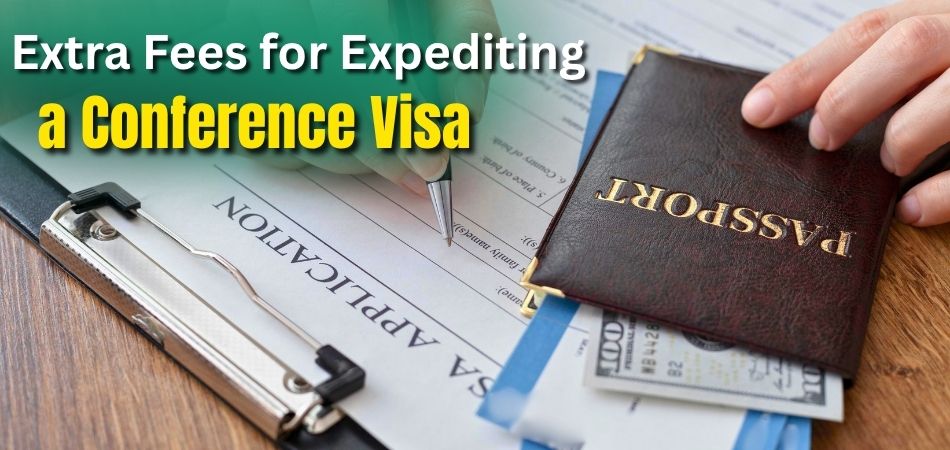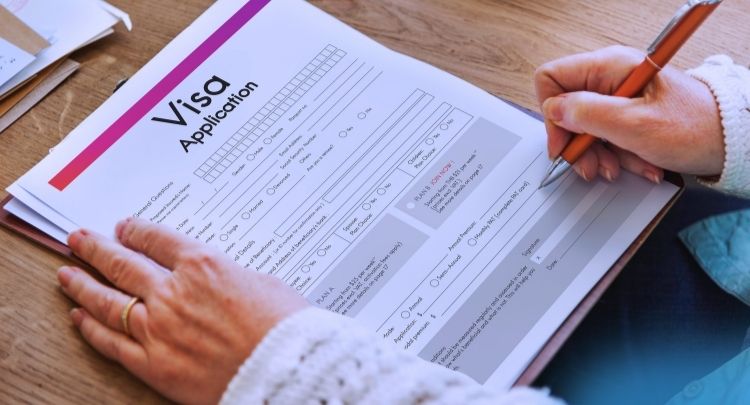Imagine getting accepted to speak at an international conference, but realizing your visa might not arrive in time. That moment of panic pushes many applicants to look for faster options, hoping to avoid missing such an important opportunity.
Are there any extra fees for expediting a conference visa? In most cases, yes. Embassies and consulates often require an additional payment if you want priority handling, and these charges are separate from the standard visa fee. The exact amount can differ depending on the country and urgency.
Still, not everyone needs to pay for this service. Sometimes, early applications or institutional support make expedited processing unnecessary, saving you both stress and money. Knowing the difference helps you plan better. Continue reading to explore how these fees work, who usually qualifies for them, and what alternatives might be available.
Are There Any Extra Fees for Expediting a Conference Visa?
Most applicants wonder if there are extra charges for speeding up their visa process. In most cases, embassies and consulates do require an additional fee for expedited handling. This is separate from the standard visa fee and often depends on the urgency of your travel dates.
For conferences, especially if you are invited as a speaker or delegate, requesting faster processing may come with an added cost. While the amount varies between countries, it’s important to check with the specific consulate handling your application. Planning ahead ensures you don’t face unexpected expenses while preparing for upcoming conferences in USA, Canada, or elsewhere.
Here’s how consulates typically charge for expedited processing:
Flat Additional Fee
Many consulates charge a fixed extra fee added to the normal visa cost. This flat-rate approach makes it easy to understand, but the amount can differ between countries. For instance, U.S. consulates may apply a set service fee, while Canadian processes can be structured differently. Applicants should also note that such fees are non-refundable, even if the visa request is denied.
Priority Appointment Fee
Some embassies don’t charge for the visa itself but for securing a faster appointment slot. Visa Application Centers often let applicants pay extra to move biometrics or interviews to an earlier date. While this helps align travel plans with urgent conference schedules, it doesn’t guarantee approval. Strong justification, such as being a keynote speaker or institutional delegate, is still required. The payment simply ensures earlier review of the application.
Courier or Document Handling Charges
In certain regions, expedited services are tied to how documents are returned. Premium courier options or urgent passport handling after a decision usually come at an extra cost. While each fee may appear small, together they can noticeably raise overall expenses. Some embassies even bundle courier services with priority processing, which means applicants should carefully check what exactly they are paying for before opting in.
By understanding these possible charges in advance, you can budget realistically and avoid surprises. Whether you are presenting research, attending as a delegate, or representing your institution, factoring in expedited fees early helps you make informed choices and stay prepared for the demands of international conference travel.
Differences Between Standard Visa Fees and Expedited Fees
Visa applicants often confuse the regular application fee with the additional cost for expedited processing. The two are separate charges, and understanding the distinction helps you avoid surprises. Below is a clear discussion of how these fees differ across important aspects, followed by a quick comparison chart.
Quick Comparison
| Aspect | Standard Visa Fee | Expedited Visa Fee |
| Purpose | Basic processing of the application | Faster review or earlier appointment |
| Refundable | Non-refundable if denied | Non-refundable if denied |
| Amount | Fixed by the consulate | Varies by country/service |
| Timeline | Normal embassy timeline | Reduced, sometimes by several weeks |
| Mandatory or Optional? | Mandatory for all applicants | Optional, only for those seeking faster review |
Purpose
The standard visa fee covers the general cost of application processing, including security checks and file handling. By contrast, the expedited fee exists only to shorten the timeline. It buys you quicker access to review or appointment slots, but doesn’t change the actual requirements of the visa application.
Refundable
Both fees are almost always non-refundable. Once you pay, the amount remains with the consulate, even if your visa is denied. Applicants sometimes assume the expedite fee will be returned if refused, but this is not the case. It is treated as a service charge, not a deposit.
Amount
Standard visa fees are usually fixed and clearly stated on embassy websites. They tend to stay stable across applicants of the same visa type. Expedited fees, however, vary depending on the service, urgency, and country. For some, it could be modest; for others, it may nearly double the total expense.
Timeline
The normal visa process follows the embassy’s workload, often taking weeks. Paying an expedited fee shortens this timeline, sometimes cutting it by half or more. For conference participants, this difference can mean making it to the event on time or missing it altogether, which makes the option critical for urgent cases.
Mandatory or Optional?
Every applicant must pay the standard visa fee, regardless of urgency. The expedited fee, however, is optional and applies only if you request faster processing. Many travelers plan ahead to avoid this added cost, but for late invitations or critical roles, paying the extra fee becomes unavoidable.
The key is to recognize that expedited fees do not replace regular visa charges; they sit on top of them. By reviewing each aspect closely, applicants can decide whether paying extra for faster handling is worth it for their situation, especially when deadlines are tied to important conferences.
Who Usually Qualifies for Paying Extra to Expedite a Conference Visa?
Not every applicant can obtain expedited processing, even if they are willing to pay. Embassies give priority to those whose absence could significantly affect the conference. Understanding who qualifies helps applicants judge whether requesting faster handling is realistic or whether they should rely on standard processing timelines.
Keynote Speakers and Panelists
Applicants invited to deliver keynote addresses or chair sessions are often given priority for expedited requests. Their role is central to the event, and their absence could disrupt schedules. Consulates recognize this urgency, making them strong candidates for paying extra and receiving quicker processing approval.
Government-sponsored Delegates
Delegates endorsed by government bodies or representing official institutions usually qualify for expedited consideration. Their attendance reflects not just personal participation but institutional or national interests. Embassies often fast-track such applicants, especially if official letters or directives are attached to the visa request along with proof of sponsorship.
Urgent Conference Deadlines
Applicants facing critical deadlines, such as last-minute invitations or presentations tied to time-sensitive research, may also be prioritized. Embassies typically require proof of urgency, like an official conference schedule or acceptance letter. While approval isn’t guaranteed, these cases have a stronger chance of being expedited when backed with clear documentation.
While fees play a role, eligibility largely depends on the applicant’s importance to the event. Demonstrating necessity through official roles, endorsements, or deadlines strengthens the case for expedited handling. For guidance, many applicants also look at an expedited visa request sample to better understand how to present their situation effectively.
When Is Paying an Extra Fee for Faster Processing Worth It?
Paying for expedited processing is not always necessary. For some applicants, standard timelines are sufficient, while for others, an extra fee could mean the difference between attending or missing an event. Knowing when it’s worth the investment helps applicants make informed, budget-conscious decisions.
Last-minute Conference Acceptance
If your paper, abstract, or application was accepted close to the event date, expedited processing may be your only realistic option. Without it, standard processing timelines might stretch beyond the conference start. Paying the extra fee ensures you can travel on time and honor your participation commitment.
Crucial Roles in the Program
Those scheduled as keynote speakers, panel moderators, or session chairs often find the expedited fee worthwhile. Their absence could create gaps in the agenda, which organizers and embassies both want to avoid. In such cases, the possibility of fast-tracking a conference visa can help ensure you fulfill your responsibilities without risking delays in travel clearance.
Urgent Research or Institutional Deadlines
When presenting research tied to funding deadlines, academic reviews, or government-backed initiatives, expedited handling is usually justified. Missing such opportunities could mean setbacks for your institution or career. In these cases, the additional cost is outweighed by the potential long-term benefits of timely participation in the conference.
Expedited fees should not be seen as a default option. They are best reserved for cases where attendance is critical or deadlines are too close to rely on standard timelines. Applicants should weigh the cost against the importance of their role to decide if the extra expense is worth it.
Hidden Costs Applicants Often Overlook in Conference Visa Applications
Many applicants focus only on the standard and expedited fees, forgetting the smaller but unavoidable expenses tied to the process. These hidden costs can accumulate quickly, especially for those applying under urgent timelines. Being aware of them helps you prepare a more realistic budget for conference travel.
Quick Checklist of Hidden Costs
- Secure courier or mailing services.
- Transport and accommodation for VAC visits.
- Certified translation or notarization fees.
- Higher costs of urgent bookings for flights and hotels.
Courier or Mailing Fees
Passports and documents often need to be delivered through secure courier services. While each fee may seem minor, multiple back-and-forth deliveries can significantly increase total costs. Applicants relying on expedited services are more likely to face urgent courier charges, especially if embassies require original documents within short deadlines.
Travel to Biometrics Centers
Visa processing often requires applicants to visit Visa Application Centers (VACs) for biometrics. For those living far from these centers, the cost of transport, food, or even overnight stays can add up. These expenses are often overlooked but become unavoidable, particularly when expedited scheduling demands quick attendance.
Translation or Notarization Costs
Conference-related documents, such as invitation letters or financial statements, may need certified translations or notarization. These services charge per page and can be costly if multiple documents are involved. While not officially part of visa fees, they are essential for meeting embassy requirements and ensuring the application is accepted without delay.
Urgent Travel Bookings
Applicants requesting expedited visas often end up booking flights or accommodations at the last minute. Prices at short notice are usually much higher, sometimes doubling the overall travel budget. This makes the visa expedition fee only one part of the financial challenge, with urgent bookings compounding the pressure.
By considering these additional costs early, applicants can avoid financial surprises later. Proper planning ensures that visa-related expenses don’t exceed expectations and allows you to focus on your actual role at the conference rather than worrying about budget overruns.
What to Do if You Cannot Afford the Extra Visa Expedition Fee?
Not every applicant has the means to pay extra for faster visa processing. Fortunately, there are practical alternatives that can reduce the pressure of added costs. By planning ahead and exploring support options, applicants can still increase their chances of attending important conferences on time.
Apply Early to Avoid the Need for Expedition
The most effective way to avoid paying for expedited services is to apply as early as possible. Starting months ahead of the conference allows your application to move through standard timelines without risk. Early preparation also reduces stress and saves you from unexpected financial burdens later.
Seek Institutional Sponsorship or Fee Support
Universities, employers, or government bodies often provide funding or reimbursements for travel-related costs. If you’re an invited speaker or researcher, approaching your institution for financial support can be a practical solution. Many organizations recognize the academic or professional value of your participation and are willing to cover extra fees.
Explore Fee Waiver Requests (Where Applicable)
Some embassies allow applicants, especially students or researchers, to request partial or full fee waivers. While not always guaranteed, submitting a waiver request backed by financial proof and official conference documents may improve your chances. This can ease financial strain and still keep your travel plans on track.
Managing visa costs can feel overwhelming, but alternatives do exist. With early applications, support from institutions, or waiver requests, you can still attend international events without overspending. Careful planning ensures your focus stays on contributing to the conference, not stressing over expenses.
Frequently Asked Questions
Visa fees and expedition rules often leave applicants with more doubts than answers. To clear up the confusion, here are some common questions that people usually ask after learning about expedited conference visas and related costs.
Can I Request Expedited Processing More Than Once?
Yes, applicants can submit multiple expedition requests if the first one is denied. However, approval depends on providing stronger documentation or clearer urgency. Simply repeating the same request without changes is usually not effective.
Do All Embassies Offer Expedited Visa Processing?
No, not every embassy provides an option for faster handling. Some countries only process visas under standard timelines, regardless of urgency. Always check the official embassy website to confirm if expedited services are available before applying.
What Happens If My Conference Gets Postponed After Paying the Extra Fee?
Unfortunately, expedited fees are non-refundable, even if the event changes dates. Applicants may still attend later if the visa remains valid. It’s best to confirm conference dates before submitting an expedition request.
Is Travel Insurance Required For Conference Visa Applications?
Most embassies do not mandate travel insurance, but it is highly recommended. Insurance covers medical emergencies, cancellations, or sudden travel changes. Having it also strengthens your application by showing preparedness and financial stability.
Can I Expedite My Visa Without an Official Conference Invitation?
Usually, no. Embassies expect solid proof, such as an invitation letter or confirmation of participation. Without this, it becomes harder to justify urgency, and consulates rarely grant expedited requests without supporting evidence from the event organizers.
Do Expedited Visas Have Different Validity Than Regular Visas?
No, the validity of the visa remains the same whether it is expedited or not. Expedited processing only affects how quickly the application is reviewed. Once approved, the visa follows standard validity rules.
Can A Travel Agent Help With Expedited Conference Visa Applications?
Yes, travel agents familiar with embassy rules can guide you through the process. They may assist with paperwork, scheduling appointments, and understanding fees. However, the final decision still rests with the consulate, not the agent.
Concluding Words
Visa applications can already feel overwhelming, and adding urgent timelines only makes things harder. Many travelers are left asking, are there any extra fees for expediting a conference visa, and How much should they really prepare for?
The answer is simple: yes, most consulates do charge an additional amount for faster handling. These fees differ across countries and situations, but they are always separate from the standard visa cost. Knowing this helps you plan your budget more realistically.
While paying extra is sometimes necessary, it isn’t always the only solution. Applying early, seeking institutional support, or checking waiver options can reduce financial pressure. Smart preparation ensures your focus stays on the conference itself, not unexpected expenses.








